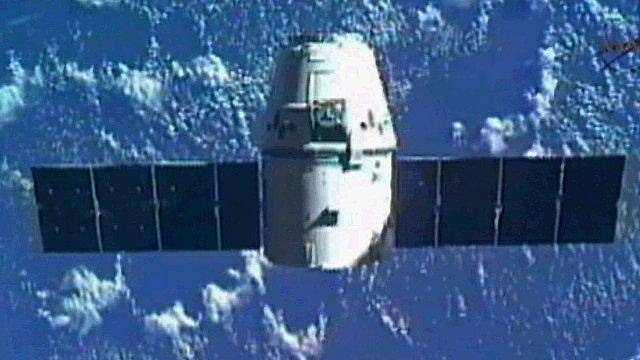Could tensions over Ukraine hit space?
- Published
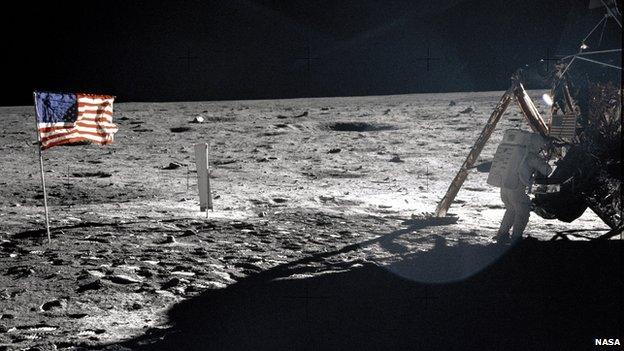
The space race was a time of rivalry between the US and the Soviet Union, but could divisions form in space again?
With the downing of flight MH17, tensions between Russia and the United States over Ukraine have reached a new high. New tougher sanctions have been put in place, targeting Russia's finance, defence and energy sectors. But Russia may have found a way to hit back - and America's space industry is its target.
When Neil Armstrong set foot on the lunar surface in 1969, it was the pivotal point in a space race that had lasted for more than a decade.
America had beaten the Soviets to the Moon.
It was a great moment of US national pride, but the two rivals soon realised they could achieve so much more by working together.
"I had no idea when I joined Nasa, wanting to be an astronaut, hoping to fly, that I would have anything to do with Russia," says Mike Foale, the British-born Nasa astronaut.
But during his 26-year career with the US space agency, he worked extensively with Russian cosmonauts as the alliance between the two nations grew.
"Collaboration between any group, and of course countries, is far more profitable for everybody than reservation and competition and being antagonistic," he explains.
"So, in the end, humans always win more if they co-operate."
Rebecca Morelle asks what US sanctions on Russia might mean for America's space programme
But today, the Americans don't just collaborate with the Russians. They depend on them.
In 2011, the Atlantis Shuttle flew its last mission. Nasa's space shuttle programme had come to an end.
Now, to get to the International Space Station (ISS) - a long-serving symbol of unity in space - the Americans have to catch a lift from the Russians on their Soyuz spacecraft, at a cost of more than $60 million a seat.
But as tensions grow over Ukraine, relations between the US and Russia are becoming ever more fraught.
Earlier this year, a leaked memo revealed that Nasa was suspending some of its ties with Russia as part of America's ongoing sanctions, apart from work on the ISS.
Russian Deputy Prime Minister Dmitry Rogozin responded by suggesting the Americans send their astronauts into space using a trampoline.
If Russia put a stop to these space taxi rides, American astronauts would be grounded. But Dr Foale says the Russians would lose out, too.
"In the case of America and Russia building the ISS, America agreed to build all of the electronics and electric power systems, and Russia agreed to build all of the fuel systems. So, we're joined together in this common endeavour and we both need each other critically," he said.
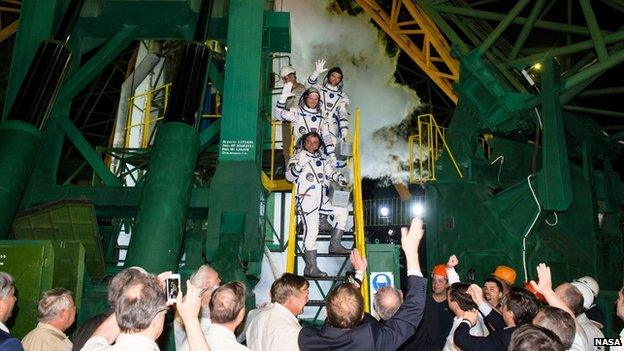
The United States pays Russia more than $60m for rides on its Soyuz spacecraft
But it's not just Nasa that relies on Russian space hardware; it's also critical for US security.
The Atlas V rockets that launch America's defence and intelligence satellites are powered by engines - called RD-180s - that are bought from Russia.
In essence, America needs Russian technology to spy on Russia.
And the supply line is looking increasingly vulnerable.
"This has become a national security concern that we do launch almost all of our reconnaissance satellites on this particular type of rocket," explains General Stephen Cheney, who runs the American Security Project, a Washington-based think-tank.
"We can't put up those satellites reliably by ourselves right now, so if Russia said 'we're not giving you any more', we would really have to scramble to find a replacement.
"But perhaps even more ironic is that we are providing the Russians with literally billions of dollars to their defence industry... and who knows what they're using that money for.
"They might even be buying anti-aircraft missiles to supply to the rebels in the Ukraine with this money."
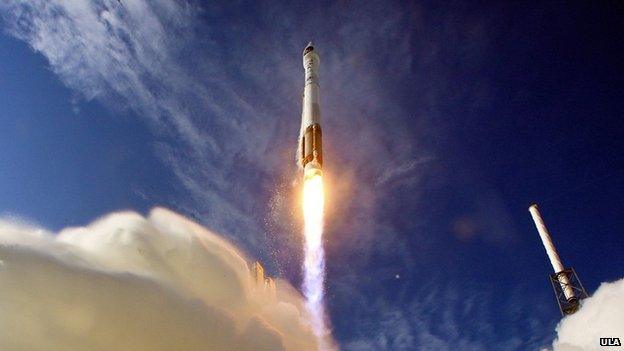
America's Atlas rockets currently use Russian-built RD-180 engines to get into space
The problem was recently highlighted during a hearing in the US Senate.
There are only 15 RD-180s left in America's stockpile, and if new sales were halted, it is estimated that critical defence and intelligence satellite missions could be delayed by up to four years while America tries to build a replacement propulsion system.
The hostility has left the US and Russia searching for new friends.
America is turning towards home-grown commercial industry to bring space manufacturing back to US soil.
Russia, though, has been looking further afield. Its eye has been caught by a new player in space: China.
Dmitry Rogozin has said Russia might end its role on the ISS in 2020, and could turn instead to the East. He's been holding talks in China to discuss deepening space cooperation between the two nations.
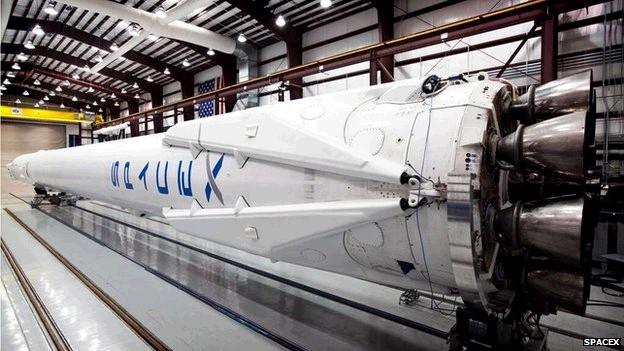
Nasa is seeking partnerships with US companies, such as SpaceX
Sergei Khrushchev has a unique perspective on the current problems.
He's the son of the former Soviet leader, Nikita Khrushchev, and was a rocket scientist during the Cold War. Now, though, he lives in America.
"The scientific community have a special relationship, based not on the political confrontation, not ideology, but on the respect of your achievements," he explains.
He says both sides have a lot to lose.
"I will be very sad if collaboration between Russia and United States, and Russia and the EU, fails. Because it is against Russian instincts, American instincts and European instincts," he adds.
"Working here with the Americans, and Americans working with the Russian Academy of Science - I am good friends with them.
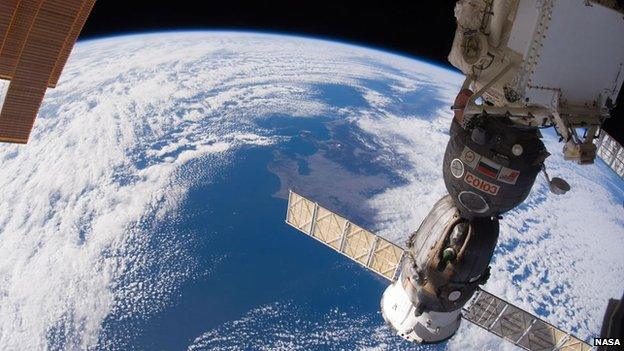
For years, space has remained detached from political upheavals on Earth - but for how much longer?
"And now with the results of the ambition of the simple-minded politicians, we have thrown everything in the garbage."
Bill Barry, Nasa's chief historian, is hopeful that Russia and the US will maintain their alliance in space.
"Of course the relationships between the US and Russia, and the Soviet Union before that, have had their ups and downs," he says.
"But space cooperation has been one of the things we have both agreed on, that it is a good thing to do and a positive example of how we can collaborate on important things.
"It is a good scientific endeavour and I think both sides see it as an opportunity to find ways to work together."
- Published14 May 2014
- Published8 January 2014
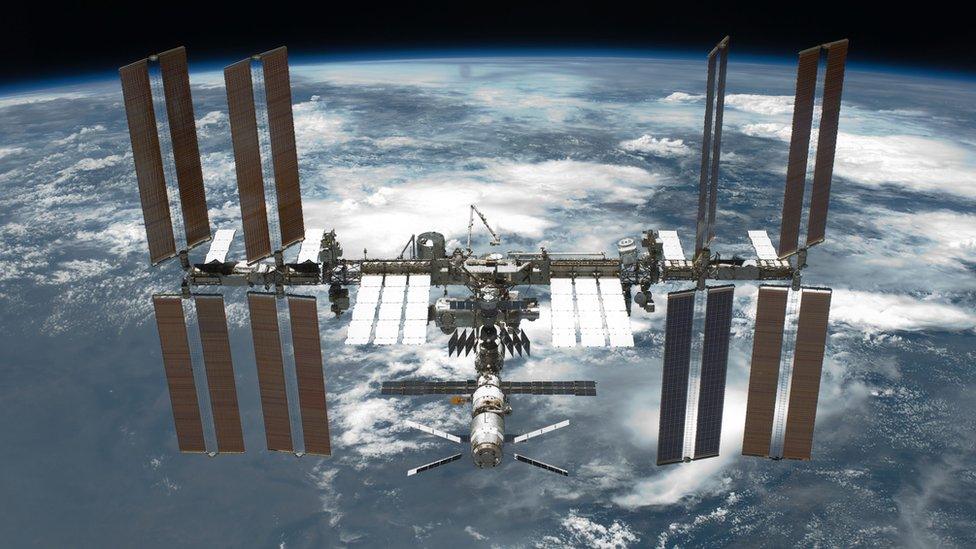
- Published29 June 2012
- Published3 August 2012
